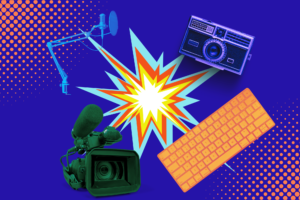Last Updated on August 3, 2023 by admin
The research shows that B2B buyers are less interested in talking to sales people and more interested in nosing around online to solve their problems. Makes sense. The internet opens up a world of information to anyone and everyone. We go online to self-diagnose medical problems so why wouldn’t B2B buyers go online to self-diagnose business problems and pain points?
What content marketing does (or should do) is rewire your promotional content into educational and informational content that meets those B2B buyers along different points in their buying journey. It’s finding a way to sate your target buyer’s need for information on an issue or question they have.
Using Stories to Generate Sales
Content marketing and storytelling is prospect-centric. To do content marketing correctly, you need to:
- Identify who your prospect is. This requires a buyer/audience persona that maps out who you should be creating content for.
- Zero in on where they like to consume content. This is Ground Zero for your distribution strategy. Are your prospects reading LinkedIn articles or do they prefer to gather info from Twitter?
- Find out what types of content your prospect is consuming. Are they interested in extensive, data-rich white papers or do they prefer short-form content they can skim on a blog?
- Figure out when they are consuming this content. This is closely tied to where they are consuming it. You can find idea times to tweet, post blogs, send emails and more here.
- Identify why they are researching online. This is tightly coupled with the persona you create in #1, where you should also pinpoint key pain points and challenges for your target.
Are you starting to see a trend? Content marketing requires you to be a journalist for your prospects. Journalism “is the activity of gathering, assessing, creating, and presenting news and information“; it is storytelling backed by data. On the other hand, marketing calls for the promotion and selling of products and services. Content marketing is a hybrid of the two that meets both your company’s need for awareness and your prospects need for information. When you produce great content that can effectively alleviate questions in your buyer’s mind and you deliver it in an interesting package on the right channels at the right time, you are a content marketer. In more fanciful terms, you are a corporate storyteller.
People want to read great stories, not be bombarded with uninvited sales pitches. If you can harness the right information about your prospects and rewire it into meaningful content packaged as an interesting story, you have the power to capture the attention – and budget – of your target audience. If you can do this successfully, you have the ability to use stories to generate sales.



